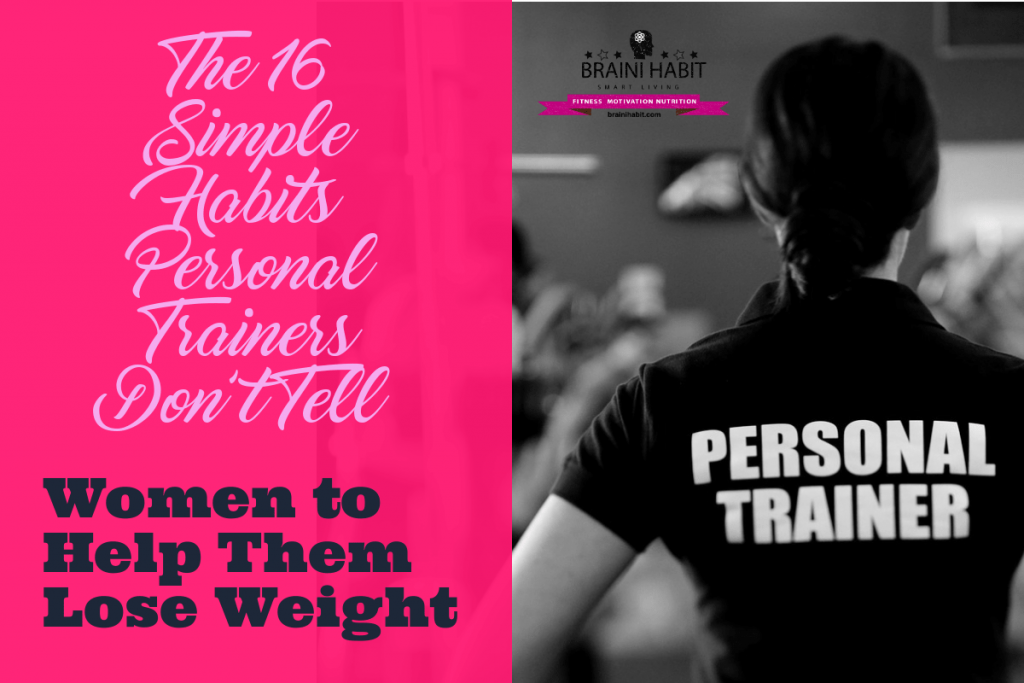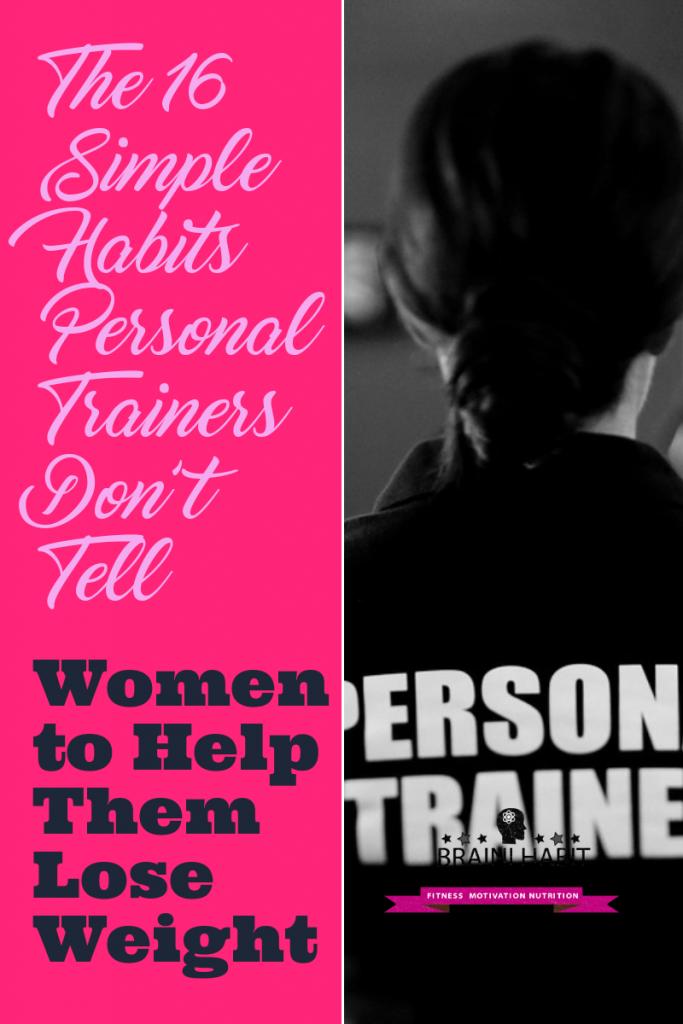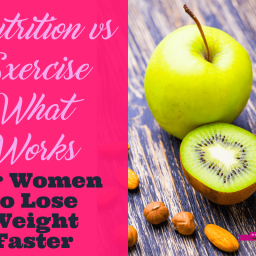The biggest hindrance when trying to live healthy, which for you means losing weight, is having access to information.
Yes, indeed you may counter and say that the internet has made all information virtually accessible, but to that, I would have two responses.
Firstly, the internet is overloaded with information- a lot of which is just blatantly false.
Secondly, not all knowledge can be found on the internet. Some knowledge is gained first through experience, then validated academically. This is the kind of information we seek to share with you in this piece.
The advice below is not random and generic. It is well thought out, practical, and actionable. It is drawn from years of experience, from moments of learning through constant failure.
That said, below are habits you should adopt to make your weight loss journey easier and to help you realize a healthy lifestyle.

- Defining Habit in the Context of Weight Loss
- 1. Weigh Yourself
- 2. Drink A lot of Water
- 3. Don’t Skip Breakfast
- 4. Cook Your Food
- 5. Don’t Eat In the Bedroom
- 6. Avoid Sugary Drinks At All Costs- Eat Fruit Instead
- 7. Learn to Rationalize Hunger
- 8. Workout With Other People
- 9. Have Many Short-Term Goals
- 10. Pack Your Gym Bag The Night Before
- 11. Avoid Processed Snacks
- 12. Practice Carb Cycling
- 13. Use the Stairs
- 14. Switch to Walking Whenever Possible
- 15. Order Minus the Carbs In A Restaurant
- 16. Pre-Cook Your Meals
- The bottom line on a weight loss journey to lose weight
Defining Habit in the Context of Weight Loss
For us, it’s a matter of principle to define each operative word in an article. There’s power in defining terms.
It clarifies the intention and theme of the article. In this particular one, habit is the operative word. The question to answer hence is: What is a habit?
Different dictionaries will have different definitions, but some similarities cut across all of them (1). The first is that habit is repeated practice. It’s something that you do over and over again.
The second similarity is that this repeated habit is almost spontaneous- it takes little thought.
The third similarity in all dictionary definitions is that a habit is not easily given up.
This article seeks to suggest some repetitive practices you could pick up to that will not only help you achieve your goals faster but will also help you sustain them.
Take-Home: You want to start practicing repetitive actions that are in line with your weight loss journey.
1. Weigh Yourself
When I started my weight loss journey, I dreaded the weighing scale- understandably so.
There’s something so blatant and direct about the weighing scale. When I got over my dread for this machine, I quickly realized that it was one of the most important tools I could have.
The weighing scale helps you assess your progress towards your weight loss goals. When you weigh yourself consistently you start to notice trends and patterns.
You are even able to see what foods negatively affect your progress! Moreover, consistent and accurate weighing will allow you to notice when you begin to plateau.
Plateauing is a weight loss concept basically describing a scenario where you no longer lose any weight despite following the same routine and diet.
The significance of the humble weighing machine has been noted by many experts, amongst them specialists from the U.S Library of Medicine, who conducted a study on self-monitoring for weight loss through the use of a weighing scale (2).
The study revealed that weight loss subjects who weighed themselves at least weekly had higher weight loss figures and were less likely to regain weight once lost!
Take-Home: A weighing scale provides important information on your weight loss progress.
2. Drink A lot of Water
This one may seem a bit obvious, but we’ve listed it nonetheless because of its importance, and to further highlight some specific benefits of drinking plenty of water, for people trying to lose weight.
First things first, how much water should you be consuming?
Well according to The National Academies of Sciences and Medicine, women need 2.7 liters of fluids a day (3). Note the use of the word fluid instead of water. We’ve used that word because water can be derived from many beverages and foods too i.e. watermelon.
There are several practical benefits to having a habit of consuming a lot of water.
When I started my weight loss journey, I consulted my physician on some of the strategies I could employ to reduce the feeling of hunger.
One of the tips he gave me was to make sure I had a bottle of water with me at all times.
His explanation, which is backed in science, is that when people diet, they often practice caloric control. Because that entails reducing the amount of food you eat, your stomach will often be constricted.
Drinking about 500 ml of water has been shown to separate the stomach walls far enough that a signal of satiation (fullness) is sent to the brain thus controlling hunger (4)!
Drinking water during a workout will also prevent dehydration, thus ensuring optimal performance.
Take-Home: Water keeps you feeling full and hydrated.
3. Don’t Skip Breakfast
Few scientists today will emphasize on the classic 3 meals a day meal plan (5). When eating for weight loss, you want to see the bigger picture- calories.
So in essence, on paper, it really doesn’t matter when you eat as long as you stick to a relatively strict calorie plan.
Practically though, several factors make us suggest that you should not skip breakfast.
According to doctor and author Daniel Jakubowicz, because the hormones that regulate your metabolism change in intensity as the day progresses, your calorie loading should match those changes (6).
Having a calorie-loaded breakfast will mean that you will feel satiated throughout the day, allowing you to have a lighter lunch and an even lighter dinner.
This habit worked miracles for me. I found that when I had a large breakfast, not only was I more energetic throughout the day, even though I was consuming fewer calories but I also felt less hungry!
Take-Home: The heavy breakfast, light lunch, and lighter dinner strategy may work wonders for you!
4. Cook Your Food
The main rationale behind a habit of cooking your food is simple- you control the ingredients that go in your food.
We make this suggestion acknowledging the fact that many people don’t have the luxury of time to cook every day, the next habit below will deal with that.
In general, though, the benefits of cooking your meal greatly surpass the inconvenience of constraining your time.
Don’t take our word for it though. According to a study conducted by the Department of Health Policy and Management, cooking at home is the most crucial habit in obesity prevention (7)!
Take-Home: When you cook your food, you control what ingredients you use, thus ensuring healthier meals.
5. Don’t Eat In the Bedroom
Admit it. At one point in your life, you had a habit of eating in bed. For me, it was during my teenage years.
I outgrew the habit as most of you probably have, primarily because I’m more conscious about hygiene.
But did you know that eating in bed has weight-loss implications too?
I’ve always intuitively known that there’s a link between eating in bed and weight gain, but I could never qualify that hunch- until now.
According to clinical psychologist Dr. Michael Brustein, when you eat in bed, you are more likely to be distracted which in turn may lead to overeating (8).
The more I think about that rationale, the more I realize that it’s true.
Think about when you eat in bed, you’re either watching TV, on your laptop, or reading your favorite book/magazine.
To replace the habit of eating in bed, you should eat sitting- perhaps at the dining table.
Take-Home: Eating in bed will expose you to distractions which may lead to over-eating. Eat sitting up instead or ideally on the dining table.
6. Avoid Sugary Drinks At All Costs- Eat Fruit Instead
Sugary drinks are the easiest way to set yourself up for failure. Here’s why. A teaspoon of table sugar has about twenty calories (9)!
To put things into perspective, there are about fifteen teaspoons of sugar in a bottle of lemonade (9).
That’s a whopping three hundred calories that will not satiate you!
To further thicken the plot, it would take you 30 minutes to an hour to burn three hundred calories off, running at a pace of five miles an hour (10).
If you’re obese, running at a pace of 5 miles an hour is hard enough! The point is, sugar is so highly concentrated in energy that very little will amount to a significant percentage of your daily caloric allowance.
Replacing a habit of drinking sugary drinks with that of eating fruits is a good way of making sure you’re not denying yourself.
That said, you must also be careful about how much fruit you consume. You see, fruits have been falsely popularized as healthy food while in fact, overconsumption of fruit will also result in weight gain.
This is because fruit contains a lot of sugar in the form of fructose.
Take-Home: The fact that sugar is highly concentrated in terms of calories means even small amounts could derail your weight loss journey.
7. Learn to Rationalize Hunger
By this, we mean that you should learn to distinguish real hunger, from ‘fake’ hunger.
More so you should have a bit of ignoring hunger signals, especially when trying to lose weight.
First things first- what is real hunger. Real hunger or true hunger is a natural reaction to low blood sugar, manifesting in weakness, a grumbling stomach, and slight tremors for some.
Ideally, when these symptoms start manifesting you know that you should eat (11).
The problem comes when you’re overweight- meaning that your body is receiving so much energy that it has to conserve some of it as fat.
When that happens, you still get the sensation of hunger because your body is reluctant to burn fat for energy (glucose is a more efficient source of energy).
So as your blood sugar levels drop, you may feel hungry. If you eat to alleviate the hunger- you’ll never lose weight.
That is because weight loss is intrinsically linked to the caloric deficit (12).
So what should you do the next time you feel hungry- even when your diet does not recommend eating at that time? You should rationalize. You should remind yourself of the facts above!
Take-Home: Remind yourself that because you’re overweight, your body still has alternative sources of energy (in fat) even when blood sugar levels are low.
8. Workout With Other People
Fitness experts will tell you that you don’t necessarily need a gym subscription to successfully lose weight.
I hold the same belief, but I also believe (from personal experience) that working out in the context of a gym or as part of a group has its own unique perks and advantages.
According to a study conducted by the University of New England, working in a group setting is a great way to handle the stresses of a difficult task (16).
Working out, especially for beginners could be termed as difficult- to say the least.
Working out with other people won’t make things easier, but the moral support you will gain from being around other people who share the same goals as you, will spur you to overcome any challenge.
In my experience, I found that I was more productive when I worked out when the gym had many people as opposed to when it was empty.
This advice comes with a disclaimer that different people may be more or less inclined to company depending on their personalities.
Take-Home: The moral support derived from working out with other people could spur you to keep going even on difficult days.
9. Have Many Short-Term Goals
One of the generic pieces of advice given for weight loss is that you should have a smart goal.
The term smart is usually an acronym for a goal that is specific, measurable, attainable, realistic and time-based.
Using this same template, when we tell you to have a habit of setting many short term goals, we are basically advising you to have a goal that is specific, measurable and time-based.
Granted it’s good to have an overarching goal- what you would call a long term goal.
However, you must break down that goal into achievable chunks. Not only will doing so boost your moral- because progress is more discernible, but it will also make it easier for you to achieve the vague long term goal.
Take-Home: Short term goals are more specific, measurable and attainable than long term ones.
10. Pack Your Gym Bag The Night Before
When faced with a daunting task such as a workout, you may find yourself actively looking for an excuse, not to workout.
I’ve found myself in this situation countless times. My go-to excuse is that I’d either forgotten my gym bag at home, or that I didn’t have any clean outfit to use.
You must anticipate scenarios like those. To counteract them, you should develop a habit of packing your gym bag the night before.
I usually go overboard and plan my workout gear a week in advance, but you get the essence.
Not only will this habit save you a lot of time, but it will also keep you at the gym consistently, thus helping you achieve your weight loss goals!
Take-Home: Preparing for the gym well in advance will keep you consistently working out and thus you’ll be able to achieve your goals faster.
11. Avoid Processed Snacks
This one goes without saying- a diet that is processed food heavy will ultimately derail your weight loss goals- period.
To qualify the statement above, a study published in the Cell Metabolism Journal confirmed the sentiment above.
In the study it was noted that diets rich in processed foods lead to excess calorie intake and ultimately weight gain (14).
Instead of consuming processed snacks, have a habit of packing some healthy options wherever you go.
We usually snack when we’re bored, so something like a few sticks of carrots will do the trick.
Take-Home: Substitute processed food with healthy options.
12. Practice Carb Cycling
This is just a sophisticated term meaning that you should only eat when and as your body needs energy.
When you achieve your weight loss goals, you’ll find that you’ve acquired the habit of carb cycling naturally, but developing the habit intentionally will help you benefit its results early on.
Carb cycling means that you eat more food on the days when you’re performing energy-intensive tasks and less when the day is pretty much sedentary.
In the weight loss journal Todays Dietitian, it is noted as an effective weight loss diet plan (15).
Take-Home: Eating only when your body needs energy is a great way to ensure weight loss by preventing overeating.
13. Use the Stairs
Weight loss is a culmination of many small decisions that you make throughout your day. One of these decisions is whether to take the elevator or the stairs.
If you’re planning to lose weight, you should forget that the elevator was ever invented. Using the stairs has so many benefits.
Firstly, it allows you to get some cardio, without having to pay for a gym. It allows you to keep burning calories even when at work!
In a journal article published to the British Journal of Sports Medicine, it was noted that regularly using stairs instead of the elevator could significantly reduce risks of cardiovascular illnesses (16)!
Take-Home: Taking the stairs will keep you burning calories even when you’re at work!
14. Switch to Walking Whenever Possible
It has always been intuitively known that women in their thirties going upwards will gain weight each year as they progress towards menopause and beyond.
Pre-menopause was blamed as the primary cause of this, but it is now clear that lifestyle changes in a woman’s life are the main causes of weight gain.
As a woman in your thirties, you’re probably in the busiest juncture of your life.
You probably have a young family begging for attention and care, a career that’s at its peak, etc. You will tend to forget to take care of yourself, understandably so.
To counteract the negative effects of a sedentary life, small measures such as developing a habit of walking whenever possible will ensure that you burn off the extra calories you don’t get to use sitting in an office chair.
Take-Home: Proactive habits such as walking will counteract the negative effects of sedentary life on weight management.
15. Order Minus the Carbs In A Restaurant
This one is both a suggested habit and a life hack. You don’t have to get rid of fine dining all together.
All you need to do is form a habit of choosing options that have as few carbs as possible.
For instance, you could order a steak with greens minus the mashed potatoes or fries, etc.
Amazingly, what you’re left with is a perfectly balanced meal- one that you’d probably eat at home!
Take-Home: Form a habit of ordering meals without carbs whenever you’re fine dining.
16. Pre-Cook Your Meals
This one really depends on how particular you are about your food, and how much time you have.
We mentioned earlier that being a woman at the peak of your life, you probably don’t have a lot of free time.
Pre-cooking your food is a great alternative to ordering out.
Granted the food may not taste as great, but the satisfaction that comes with knowing that you’ve eaten perfectly measured out portions is well worth it.
Take-Home: Pre-cooking is a great alternative to ordering out, especially for those who don’t have time to cook.
The bottom line on a weight loss journey to lose weight
The advice above is not random and generic. It is well thought out, practical, and actionable.
We are certain that the habits above will help you on your weight loss journey, but more importantly, they will help you live a healthier life. Good luck!





